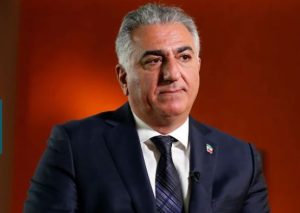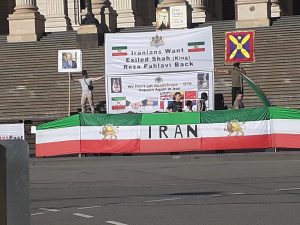Iranian crown prince the poster boy for democracy movement
It’s a slow-burn global movement that was recently manifest locally on the steps of Victoria’s Parliament House.
A democracy push by Iranian exiles envisages the country’s exiled crown prince Reza Pahlavi as the key to a return to secular freedom and open elections.
And as unrest and protests continue in Iran, the crown prince is taking a greater role, and attracting more attention in some quarters.
He’s advocating for regime change and wants to play a lead role in a council, formed with other opposition figures in the Iranian diaspora, who claim to represent the country’s democracy movement.
Melbourne-based pro-Pahlavi activist Reza*, who coordinates a local advocacy group that regularly meet on the steps of Parliament House, says most Iranians want change.
“Ordinary Iranians are sick of the repression and power that a few religious extremists have over the people,” he said.
“We want to see Iran return to democracy and secularism. But we want this on our own terms – not something imposed by foreign governments.”
 But Reza said he and his fellow activists were not blind to the dangers of returning to an all-powerful Monarchy.
But Reza said he and his fellow activists were not blind to the dangers of returning to an all-powerful Monarchy.
“We understand that there were issues when the Shah ruled Iran. There were brutal acts by the secret police. But the prince says he does not want to be the ruler,” Reza said.
“He is calling for a democratic government in Iran and we support that,” he said.
But after more than 40 years living abroad, mostly in the United States, Reza Pahlavi remains a polarising figure.
While he talks up democratic, secular, and liberal aspirations that many Iranians find attractive, he lives in the shadow of his late father, the Shah.
While many want to see an end to current theocratic system of the Ayatollahs, many are also uncomfortable about a return to a monarchy.
Iranians have been risking their lives taking to the streets in the latest wave of protests, sparked by the death last September of 22-year-old Kurdish woman Mahsa Amini while in the custody of the country’s morality police.
The 22-year-old died after being arrested for allegedly “improperly” wearing her hijab, triggering widespread outrage and calls for regime change.
The prince has said he does not seek a role as a future leader of Iran, and whether Iran’s people chose a republic or monarchy to replace the mullahs is their choice.
But he has said he wants the Iranian people to endorse him to help overthrow the Islamic Republic and lead the transition towards a secular democracy.
Speaking to ABC News recently, the prince said: “The role that I’m offering in this process of transition is to be of help to maintain a smooth process — to maximise the participation of democratic forces in this process”.
“The merits of secularism and the separation of religion from state as a primordial principle and precondition to democratic order,” he said.
“We learned it the hard way, after more than 43 years of a religious dictatorship,” the prince said.
The prince’s vision for a secular democracy also includes other fundamental principles.
He says there is the need for greater tolerance and acceptance of Iran’s disparate ethnic and religious groups.
This, he says, must be coupled with a system of effective checks and balances.
“Civil society, watchdogs and society that have everything under scrutiny, so you don’t have a concentration of power,” he said.
 On February 11, which marked the 44th year of the Islamic Revolution and was met by anti-Islamic Republic protests in cities all around the world, eight prominent opposition figures, including Pahlavi, came together at an event in Washington DC.
On February 11, which marked the 44th year of the Islamic Revolution and was met by anti-Islamic Republic protests in cities all around the world, eight prominent opposition figures, including Pahlavi, came together at an event in Washington DC.
They spoke in support of one common message: for democratic countries to support the Iranian people in overthrowing the regime and establishing a secular democracy.
But Iran’s opposition has been characterised as being split into different factions, including monarchists, republicans, socialists as well as groups formed within ethnic minorities including Kurds, Baluchis and Arabs.
The new group claims to be working on behalf of those Iranian dissidents, activists, intellectuals, locked up in jails – many of whom have been subject to torture and some of whom face the death penalty.
When an Islamic Revolution overthrew the monarchy in Iran in February 1979, Pahlavi was 18 and had just finished high school.
He was undergoing military training as a fighter jet pilot in the United States and later was to return home to Iran, given his position as heir to the Pahlavi throne.
But when the monarchy led by his father, the then-Shah of Iran, Mohammad Reza Pahlavi, was overthrown by a group led by the religious cleric Ruhollah Khomeini, it forced the prince’s family to flee. The Shah died about a year later in Egypt.
Prince Reza Pahlavi became the exiled crown prince of Iran and has remained in the US ever since.
For more than forty years, he has been highlighting the Islamic Republic’s grave human rights abuses and calling for regime change via non-violent uprising.
*Names have been changed to protect family members still in Iran












